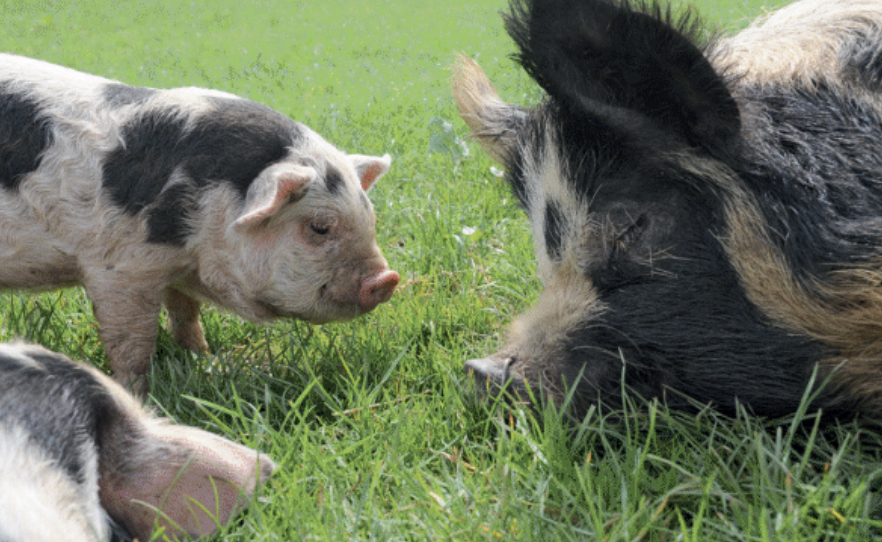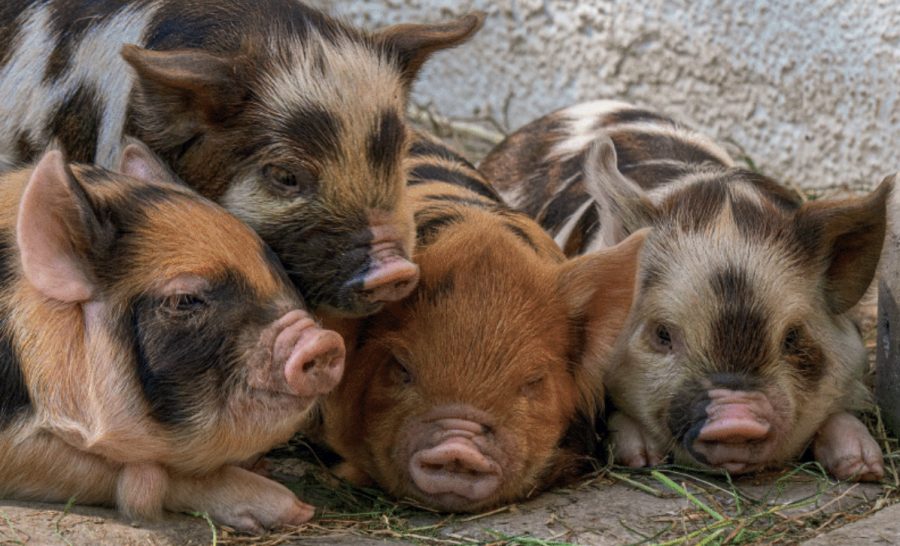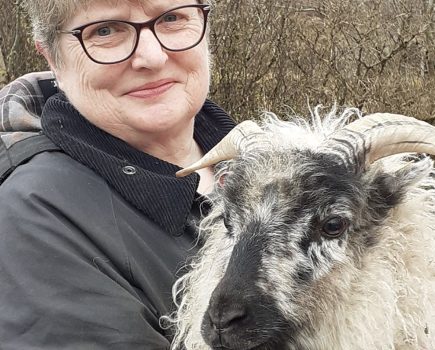Joanna Palmer, nutritionist for Smallholder Range, offers timely advice on feeding micro pigs, Kune Kunes and Pot-Bellies to keep them happy, healthy and in an ideal body condition.
By their very nature, most pigs have voracious appetites and will hungrily devour any food that is offered, but these heathy appetites will inevitably lead to an expanding waistline!
The Maori translation for Kune Kune is “fat and round” and the Pot-Bellied name alone clearly indicates these breeds have a natural tendency to be stocky and well-covered.
However, when keeping Kune Kunes, Pot-Bellies, micro pigs and any other breeds as pets, it is important to prevent excessive weight gain as obesity can have serious long term health implications and cause foot and joint problems from excessive weight bearing.
Keeping your pigs at a healthy body weight by encouraging them to move around, avoiding the temptation to over feed them and using body condition scoring to assess their weight is key to preventing obesity.
BODY CONDITION SCORING
Body condition scoring is a useful hands-on tool for assessing the muscle and fat coverage of an animal to determine their overall condition. Pigs should be assessed over the shoulders, ribs, spine and hips through a combination of sight and touch using the palm of the hand. At a healthy weight and condition a pig will have a spine that can be felt when you run your hand firmly along its back. A spine that can be seen or felt very easily with a light touch indicates that the pig is thin, whereas a pig with a spine that cannot be felt even with firm pressure is likely to be overweight.
On a scale of 1-5, where 1 is emaciated and 5 is obese, you should aim to keep your pigs at a healthy body condition score of 3.
HIGH FIBRE, LOW CALORIE FEED
In the wild Pot-Bellied pigs and Kune Kunes thrive on a high fibre diet that consists mainly of grass, nuts, berries, insects, fruits and vegetables. These types of pigs should not be fed commercial pig diets as the high protein and energy levels of these feeds are likely to lead to fast growth and excessive weight gain.
Instead, Smallholder Range Pot-Bellied Pig Food has been specifically formulated to combat the problem of obesity in all types of pigs that do not require a specific rearing or breeding feed. With a higher fibre content and lower calorie and protein levels, Pot-Bellied Pig Food will provide a nutritionally balanced diet, including the essential vitamins and minerals your pigs need. As a maintenance diet, an adult pig will need to eat between 1 and 2% of its bodyweight per day in total feed, so it is important to weigh your pigs or be able to make an accurate estimate of their body weights in order to feed them appropriate quantities.

ENCOURAGING FORAGING BEHAVIOUR
With Kune Kunes likely originating from the tropical islands of Asia and Pot-BelliedPigs from Vietnam, their natural diets are likely to be a little more exotic than we can offer in the UK! Nonetheless, supplementing their bagged feed with a variety of fruits and vegetables including apples, pears, soft fruit, lettuce, cucumbers, root vegetables and greens makes for happy pigs!
These additional feed stuffs should be included in the recommended feeding quantities of 1-2% of each pig’s bodyweight, and the amount of Pot-Bellied Pig Food adjusted accordingly. All feed should be split into several smaller meals and fed at intervals throughout the day. Placing feed in several different areas of the pigs’ enclosure and even hiding some will encourage their foraging instincts and help to alleviate boredom by extending feeding time. Fibre in the form of grass, hay and straw should be available to provide gut fill and to prevent constipation.
Providing your pigs with as much outside space as possible will allow them to fulfil their natural foraging behaviour, which encourages exercise, and in turn burns calories and helps to keep bodyweights in check. Depending on what natural food there is available within their enclosure, pigs can further supplement their diet with brambles, earthworms, acorns and other seasonal produce such as windfall fruit.
Pigs are highly sociable animals and should be kept in the company of their own kind where they will form a herd hierarchy. Care should always be taken to ensure that every member of the herd receives their fair share of feed as the more timid animals are likely to be bullied away from food by the dominant leaders.
Ensuring adequate trough space or spreading feed out across a large area will help to reduce competition at feeding times. A constant supply of clean, fresh water is also essential. In the heat of summer, even small breed pigs can drink large quantities, so if you do not have self-filling waterers you will need to fill up their water source several times a day to prevent dehydration. In winter, the ice on troughs should be broken regularly and pipes well insulated to allow pigs adequate water intake.
DO NOT FEED KITCHEN SCRAPS
Whilst supplementing your pigs’ diet with additional fruits and vegetables is actively encouraged, it is important to remember that to prevent the introduction and spread of potentially devastating notifiable animal diseases, such as Foot & Mouth, it is illegal to feed catering waste, kitchen scraps, meat or meat products to farmed animals. This also means that any fruit and vegetables you intend to feed your pigs cannot enter your kitchen or be purchased from an establishment that also sells meat, and you most certainly cannot feed your pigs any leftovers from the family dinner table!
For more information on feeding your pigs contact the friendly Smallholder Range Advice Line on 01362 822900 or visit www.smallholderfeed.co.uk
This article originally appeared in the July 2023 issue of The Country Smallholder magazine. To receive regular copies of The Country Smallholder magazine featuring more articles like this, subscribe here.
For FREE updates from the world of smallholding, sign up for The Country Smallholder newsletter here.








